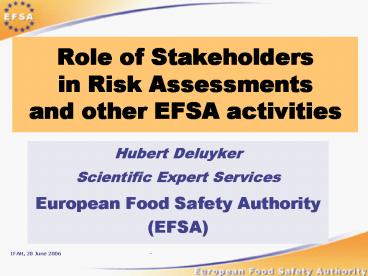Role of Stakeholders in Risk Assessments and other EFSA activities
1 / 24
Title: Role of Stakeholders in Risk Assessments and other EFSA activities
1
Role of Stakeholders in Risk Assessments and
other EFSA activities
- Hubert Deluyker
- Scientific Expert Services
- European Food Safety Authority (EFSA)
2
Objectives
- EFSAs remit and tasks
- How are the tasks carried out
- Interaction with stakeholders
3
Definition of stakeholder
- An independent party with whom money or counters
wagered are deposited - A person with an interest or concern in
something
4
EFSA MISSION Regulation EC 178/2002General Food
Law
- Scientific Advice and Support for
- European Communitys (EC)
- legislation and policies in
- Food and Feed Safety,
- Animal Health Animal Welfare,
- Plant Health, and
- Genetically Modified Organisms
5
EFSA Stakeholders
- Wide remit of interest to many stakeholders
- Legal stakeholders
- EFSA has legal basis for interaction
- European Commission, European Parliament, and the
Member States - Civil society stakeholders
- Consumer groups, retailers, distributors,
farmers, and NGOs
6
Main Tasks Scientific Opinions
- Provide scientific opinions to the European
Commission, the European Parliament, and the
Member States - Promote and coordinate development of uniform
risk assessment methodologies - Identify emerging risks
7
Main Tasks Other scientific activities
- Scientific and technical assistance to the
Commission - Collection, collation, analysis, and
summarisation of scientific data - Commissioning of scientific studies
- Establishment of a system of networks of
organisations
8
Main Tasks Risk Communication
- Provide rapid, reliable, objective, and
comprehensible information to the public - Express itself independently
9
EFSA TASKS
- Confidence of consumers and other stakeholders in
EFSA is considered essential. - Hence independence, high scientific quality,
transparency, and efficiency are to be vital
characteristics of EFSA. - Independence does not mean EFSA operates in a
vacuum. - Thus, EFSA bodies interact frequently with
various stakeholders.
10
EFSA BODIES
- Management Board
- Advisory Forum
- Scientific Committee and Scientific Panels
- Executive Director and EFSA staff
11
Management Board
- 15 Members chosen for their competence, with
diverse backgrounds - Legal stakeholders Commision and Member States
- Civil society stakeholders farmers, retailers,
and consumers - EFSA 2005 external evaluation
- Stakeholder consultation
12
Advisory Bodies toExecutive Director
- Advisory Forum networking with the Member
States risk assessment organisations - Stakeholder Consultative Platform advises on
stakeholder policy
13
Scientific Committee and9 Scientific Panels
- Issue Scientific Opinions
- Questions from
- European Commission, European
- Parliament, Member States, Self-tasking
- Independent Scientists
- Selected for excellence geographical
- distribution
- Max 21 per panel
- Appointed for 3 years May 2006
14
Regulated Substances reviewed in Standing
Working Groups
- Genetically Modified Organisms (GMO)
- Additives and products in animal feed (FEEDAP)
- Food additives, flavourings, processing aids,
materials in contact with food (AFC) - Dietetic products, nutrition and allergies (NDA)
15
Guidance Document GMO Panel for risk assessment
of genetically modified plants, food, feed
- Internet Consultation
- Publication on EFSA website on 7 April 2004
- Written comments until 9 May 2004
- GMO competent authorities/ risk assessment
bodies, Scientific institutions, Environmental
organisations, Consumer organisations, and
Industry groups - 38 contributors provided 460 specific comments
16
Follow up
- Stakeholder consultation 25 May 2004
- The GMO Panel considered all stakeholder comments
before finalising the guidance document - A summary of the stakeholder consultation meeting
on the EFSA website - Further updating of the guidance always involves
a consultation step
17
Specific questions reviewed in ad hoc Working
Groups
- Plant Health, Plant Protection Products (PPR)
- Dietetic products, nutrition and allergies (NDA)
- Animal Health and Welfare (AHAW)
- Biological hazards (BIOHAZ)
- Contaminants in the food chain (CONTAM)
18
Stakeholders may be consulted
- Types of organisations consulted depends on the
nature of the question - In the public domain
- other European organisations (EMEA and ECDC) or
- worldwide organisations (OIE, WHO, and FAO) may
be invited - Professional organisations (e.g. IDF, IFAH)
19
EFSA Organigram
Office of the Executive Director
MANAGEMENT BOARD
Communications
Institut. Affairs
Science
Legal Affairs
Scientific Expert Services
Scientific Committee Scientific Panels
Press Office
Finance
Publications
Human Resources
WEB
Inform Technology
Accounts
Quality MGMT
20
Other Scientific Activities in Scientific Expert
Services
Data collection and analysis e.g. zoonoses, food
consumption Networks with Member States Other
organisations may be involved EFSA Scientific
Colloquia Open to all stakeholders
21
Discussion
EFSA interacts with many stakeholders and in
various ways Objective confidence of consumers
and other stakeholders in EFSA How Contribute
to scientific quality, transparency, and
efficiency while maintaining EFSA independence
22
Conclusions
- Formal stakeholder policy under development
- consolidate current stakeholder activities
- formalise EFSA interaction with stakeholders
- EFSAs Department of
- International and Institutional Relations is
responsible
23
Problems with food and feed occur both with
imports and with goods manufactured in the EU
- Cadmium in animal organs (kidney, liver) and
shellfish - Dyes in Spices or Palm oil Vibrio vulnificus V.
parahaemolyticusin raw and undercooked seafood - Foot and Mouth Disease
- (http//www.efsa.eu.int/science/ahaw/ahaw_opinions
/1357_en.html)
24
World Meat Production a historical perspective,
1990-2005
Driven by Gains in Poultry/Pork Sectors
Growth in Developing Countries
25
The EU The Story of a Rising Meat Importer
Beef 520,000 Ovine 230,000 Pigmeat
80,000 Poultry 600,000
26
Porcine Production Surplus
27
Bovine Production Surplus
28
Small Ruminant Production Surplus
29
www.efsa.eu.int Now www.efsa.europa.eu
Grazie per la vostra attenzione!

